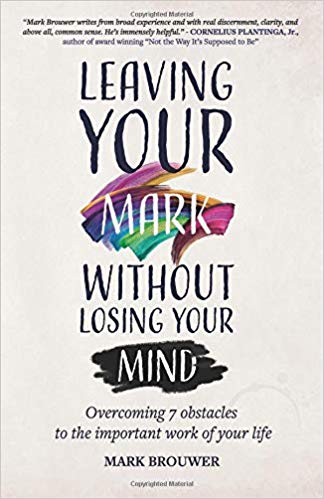Leaving Your Mark Without Losing Your Mind:
Overcoming 7 Obstacles to the Important Work of Your Life
by Mark Brouwer
–Review by Teri Hyrkas
Good answers often begin with good questions. Here, from author Mark Brouwer, are some good questions that were the basis of his book, Leaving Your Mark Without Losing Your Mind:
“When people are drawn to do important work to help others, what is it that:
• causes them to quit?
• diminishes their effectiveness?
• prevents them from even starting in the first place?”
Drawing on his years of experience as a director of spiritual formation, personal coach and advisor for various recovery groups, and by distilling constructive insights from mentors in his field, Brouwer has responded to these questions with innovative, beneficial answers.
Early on in Leaving Your Mark, Brouwer states this caveat: “Be prepared to read more about problems than solutions. This book is organized around seven roadblocks that prevent or interfere with our engagement with meaningful service. As you read, you’ll likely notice that I spend a lot more time describing each problem, and much less time suggesting remedies….As Charles Kettering put it: ‘A problem well stated is a problem half-solved. ‘ ” (p 9)
Brouwer does an excellent job of defining the roadblocks to meaningful servant-leadership in these seven chapters:
1. Losing Touch With What You Really Care About
2. Getting Overwhelmed by the Needs You Encounter
3. Struggling With Not Having Enough Time
4. Living With Confusion
5. Stress Burn Out
6. Conflicts
7. Difficult People and Discouragement.
The author includes plenty of helpful, immediately applicable suggestions for dismantling barriers for those not in leadership, as well, particularly in Chapter 6 — “Conflicts.” Here Brouwer writes about the feelings of vexation that can arise in a community from frequent conflicts with difficult people. His recommendations for how to approach a conflict and what it means for a community to achieve harmony rather than unity are wise, constructive observations that can have a bearing on many relational situations.
I believe one of the strongest ideas in Leaving Your Mark is this: “True community is not efficient…true community takes time. We have to work through misunderstandings. We have to explain things, listen to people’s questions and concerns, and apologize when we have done or said something hurtful. Time is the price we pay for authentic community. That’s why healthy community is so rare. If we are not willing to pay that price, we might have efficiency, and we might have “success” in a certain endeavor for a while, but it won’t last. The relationships will fray, and some kind of toxic relational dynamic will blow things up.” (pp244-245)
Leaving Your Mark Without Losing Your Mind: Overcoming 7 Obstacles to the Important Work of Your Life, provides thoughtful counsel for those serving as leaders. Brouwer blends his guidance with clear insight and an adroit sense of humor. The discernment which runs throughout Leaving Your Mark may be due to the fact that Brouwer is himself a pastor. His awareness of the demands of a pastor’s schedule, the challenges, frustrations and joys of congregational life adds the ring of authenticity to his words. Brouwer is not only a theorist when to comes to developing healthy ways of working with people but a practitioner of his own ideas, as well.
Mark Brouwer has asked good questions about how one can successfully stay committed to important, necessary, demanding work. Through research and collaboration with mentors and others, he has produced a book that is filled with reliable, actionable answers. These answers are beneficial on a personal, team and community level. If you have been wrestling with the demands of your vocation, you may find solutions and a way forward here, in Leaving Your Mark Without Losing Your Mind.

